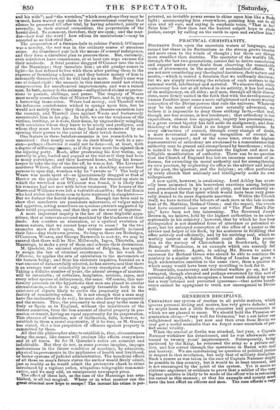PRACTICAL CHRISTIANITY.
DOCTRINE floats upon the uncertain waters of language, and cannot but share in its fluctuations as the stream grows broader and more open to the winds of thought ; but there are things more steadfast than doctrine. The spectator of the world's life, through the last two generations, cannot fail to derive consolation and support under every doubt from observing the remarkable train of phaenomena in the matter of ecclesiastical affairs, we are not now considering any theological doctrines, their nature and merits,—which is indeed a function that we uniformly disclaim; but we are simply reviewing the relation of such matters to the external world, intellectual and material. We observe that, while controversy has not at all relaxed in its activity, it has lost much of its malignancy, on all sides; as if men, through all their dissem sions, more firmly united in the faith that with the development of human faculties must come a more enlightened and a more worthy conception of the Divine powers that rule the universe. Whatever may be the merit of doctrines now severally advocated, we believe it is impossible to deny these striking facts,—that zeal, though not less zealous, is less intolerant; that orthodoxy is less supercilious, dissent less oppugnant, inquiry less presumptuous; to a great extent bigotry has laid aside its malignancy, and free- thinking of the freest kind is no longer blank scepticism. In every distraction of council, through every change of doubt, a more reverential and trusting recognition of eternal in- fluences is apparent ; and at the same time, even the highest representatives of orthodoxy are awakened to a remembrance that authority may be graced and strengthened by beneficence ; which is indeed to the simple and ignorant the highest and most in- telligible manifestation of authority. There can be no question that the Church of England has lost an immense amount of in- fluence, for extending its moral authority and for strengthening its own position, by neglecting its office as the adviser and helper of the poor, the ignorant, and the helpless ; an office performed by every church that zealously and intelligently seeks its own enlargement. A new spirit, however, is awakening. Lord Ashley has avow- edly been animated in his benevolent exertions among helpless and proscribed classes by a spirit of piety, and has evidently ex- torted a respect for that spirit which would have been very gene- rally denied to its mere dogmatic assertion. Within the Church itself, we have noticed the labours of such men as the late incum- bent of St. Matthias, Bethnal Green ; and the sequel, the events that have occurred since our notice of "The Poor Man's Pic- nic," have been not less interesting. The Reverend Joseph Brown is, we believe, held by the highest authorities to be unex- ceptionable in his ministry ; however, that by which he has been distinguished is not doctrinal force of utterance or polemical vi- gour, but his enlarged conception of the office of a pastor as the adviser and helper of his flock, by his acuteness in fulfilling that office actively and efficiently, and by his untiring zeal, which no worldly interest or failing health could abate. His promo- tion to the rectory of Christchurch in Southwark, by the Bishop of Winchester, is an example which can scarcely fail to animate others. Again, in asking Mr. Brown to name a successor for Bethnal Green who should be able to continue the ministry in a similar spirit, the Bishop of London has given a high authoritative sanction to the same view, from a quarter in which many would have been very unwilling to look for it.
Meanwhile, controversy and doctrinal warfare go on, not in- terrupted, though elevated and perhaps sweetened by this sort of spiritual chivalry, which recognizes a broad truth denied by none but a verfdebased and perverted ignorance—that active benefi- cence cannot be oppugnant to truth nor uncongenial to Divine will.


























 Previous page
Previous page